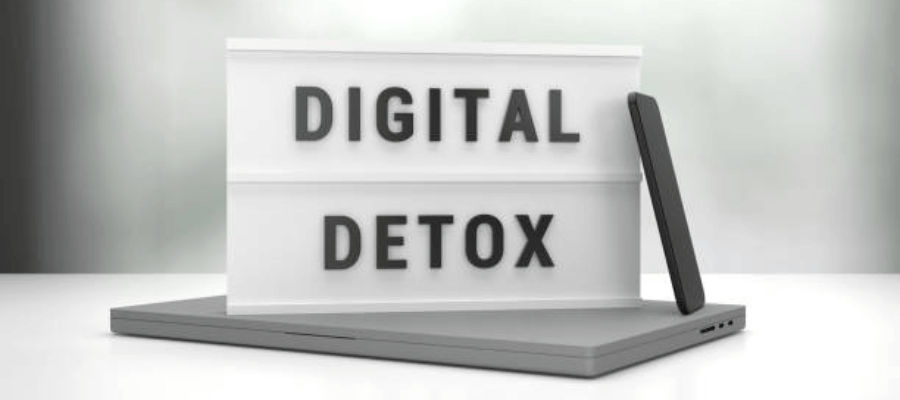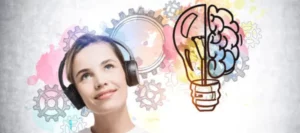- What Are Digital Detox Retreats?
- Benefits of Digital Detox Retreats
- Digital Detox Techniques for Everyday Life
- The Impact of Digital Detox on Mental Well-being
- Who Should Consider a Digital Detox Retreat?
- Rethinking Digital Detox: A Balanced Approach
- Balancing the Digital and Analog Worlds
- Planning Your Digital Detox Retreat
- Measuring the Impact of Digital Detox Retreats
- The Ongoing Quest for Data
- The Future of Digital Detox Retreats: Evolving in the Digital Age
- The Enduring Appeal of Digital Detox Retreats
- Frequently Asked Questions (FAQ)
- Conclusion
In this article, we’ll immerse ourselves in the world of digital detox retreats, exploring how these unique experiences, focused on unplugging, can help you regain mental clarity in a noisy digital world.
In today’s hyperconnected digital landscape, finding respite can feel like an uphill battle. With screens omnipresent in our lives, notifications vying for our attention, and the constant digital hum, it’s easy to become overwhelmed. That’s where “Digital Detox Retreats” come into play.
What Are Digital Detox Retreats?
Digital Detox Retreats are immersive experiences designed to help individuals break free from the shackles of their digital devices.
These retreats provide a serene environment far removed from the distractions of everyday life. Participants are encouraged to disconnect from their smartphones, tablets, and laptops, allowing them to focus on themselves and their well-being.
The Retreat Setting
Digital Detox Retreats often take place in tranquil settings, such as secluded cabins in the woods, serene beaches, or remote mountain retreats. These locations are intentionally chosen to minimize exposure to technology and maximize the connection with nature.
Guided Programs
Participants in these retreats are guided through a structured program that includes mindfulness practices, outdoor activities, and opportunities for self-reflection. These activities help attendees recalibrate their minds and bodies.
Benefits of Digital Detox Retreats

Mental Clarity and Focus
One of the primary benefits of Digital Detox Retreats is the restoration of mental clarity. Without the constant barrage of emails, social media updates, and news alerts, participants can regain their ability to concentrate and think clearly.
Reduced Stress and Anxiety
The digital world can often be a source of stress and anxiety. Constant comparison, fear of missing out (FOMO), and the pressure to be always available take a toll on our mental health. Digital Detox Retreats provide a much-needed break from these stressors.
Improved Sleep
The blue light emitted by screens disrupts our sleep patterns. By disconnecting from digital devices during a retreat, participants often report better sleep quality and a more rested feeling upon waking.
Enhanced Creativity
A break from digital distractions allows our creative juices to flow freely. Many attendees find that their creativity is rekindled during these retreats, leading to innovative ideas and fresh perspectives.
Digital Detox Techniques for Everyday Life
While Digital Detox Retreats are a fantastic way to reset and rejuvenate, incorporating digital detox techniques into your daily routine can help you maintain mental clarity in the long run. Here are some practical tips to help you unplug and find balance in our hyperconnected world.
1. Set Screen-Free Zones
Designate certain areas in your home, such as the dining room or the bedroom, as screen-free zones. This will help you disconnect from technology during crucial moments, like meals and bedtime.
2. Establish Tech-Free Time
Allocate specific times during the day when you will put away your devices. Whether it’s an hour in the morning for meditation or an hour before bedtime for reading, having tech-free periods can make a significant difference.
3. Disable Non-Essential Notifications
Constant notifications can be a major source of digital distraction. Go through your device settings and disable non-essential notifications, allowing you to check messages and updates at your convenience.
4. Practice Mindfulness
Mindfulness exercises, such as meditation and deep breathing, can help you stay grounded and focused. Incorporate these practices into your daily routine to reduce the urge to constantly check your devices.
5. Unsubscribe and Declutter
Take the time to unsubscribe from email lists and social media accounts that no longer serve you. A clutter-free digital life is easier to manage and less distracting.
6. Use Technology Mindfully
Technology itself is not the enemy; it’s how we use it. Be intentional about your screen time. Use apps and tools that enhance your well-being rather than detract from it.
7. Reconnect with Nature
Spend time outdoors and immerse yourself in the natural world. Nature provides a soothing break from screens and a chance to rekindle your connection with the physical environment.
8. Prioritize Face-to-Face Interaction
Whenever possible, prioritize face-to-face interactions over digital communication. Meeting friends and family in person fosters deeper connections and reduces the need for constant digital contact.
9. Create a Digital Detox Plan
Develop a personalized digital detox plan that outlines your goals, boundaries, and strategies for managing screen time. Regularly review and adjust this plan as needed.
By incorporating these digital detox techniques into your daily life, you can maintain the mental clarity and balance you gain from retreats and create a healthier relationship with technology.
Remember, achieving a digital detox is not about complete avoidance but about finding a harmonious balance between the digital and offline worlds.
The Impact of Digital Detox on Mental Well-being

As we continue to explore the world of Digital Detox Retreats and the techniques to maintain a balanced digital life, it’s essential to delve deeper into the profound impact these practices can have on your mental well-being.
Mental Resilience and Stress Reduction
Digital Detox Retreats provide a unique opportunity to disconnect from the constant barrage of information and demands. Over time, this detachment can lead to increased mental resilience, as participants learn to manage stress without relying on digital distractions.
Enhanced Focus and Productivity
Unplugging from the digital world allows your brain to reset and regain its ability to focus. Many individuals find that their productivity levels soar after a retreat, as they can concentrate on tasks without constant digital interruptions.
Improved Emotional Regulation
The constant exposure to social media can lead to negative emotions, such as envy and anxiety. A digital detox can help individuals regulate their emotions better by reducing the triggers for these feelings.
Better Sleep Quality
The blue light emitted by screens disrupts our circadian rhythms and makes it challenging to fall asleep. By disconnecting from digital devices during a retreat and adopting a tech-free bedtime routine in daily life, participants often report improved sleep quality.
Greater Self-Awareness
Digital Detox Retreats encourage self-reflection and mindfulness. Participants often gain a deeper understanding of themselves, their values, and their priorities, leading to increased self-awareness and personal growth.
Enhanced Relationships
Digital distractions can erode the quality of our relationships. By disconnecting from screens and focusing on face-to-face interactions, individuals can strengthen their bonds with loved ones.
Reduced Information Overload
The digital age bombards us with an overwhelming amount of information daily. A digital detox allows individuals to step away from this constant flow of data and regain a sense of control over the information they consume.
Rediscovering the Joy of Simple Moments
In our digital age, we often overlook the simple pleasures of life. Digital Detox Retreats and daily practices help people rediscover the joy of reading a physical book, going for a walk without distractions, or savoring a meal without scrolling through their phones.
By integrating the lessons learned during a retreat into your daily life, you can experience lasting benefits, fostering a sense of balance, clarity, and well-being.
So, whether you’re considering a retreat or simply looking for ways to unplug in your daily routine, the journey towards mental well-being in the digital age is within your reach.
Who Should Consider a Digital Detox Retreat?
Digital Detox Retreats are suitable for anyone who feels overwhelmed by the constant demands of the digital world.
If you find it challenging to disconnect, are experiencing burnout, or simply seek a break from technology, these retreats can be a valuable experience.
Business Professionals
Entrepreneurs, executives, and employees in high-stress industries often benefit greatly from a digital detox. It can lead to increased productivity, better decision-making, and improved work-life balance.
Students and Screen-Addicted Teens
Young adults and students who spend hours glued to screens for academic or social reasons can find respite and learn healthier tech habits at these retreats.
Families
Digital Detox Retreats are also available for families, encouraging quality time together without the distractions of devices. It’s an excellent opportunity for bonding.
Rethinking Digital Detox: A Balanced Approach

While Digital Detox Retreats have gained popularity for their ability to help individuals disconnect from the digital world and regain mental clarity, it’s essential to consider a balanced approach to our digital lives.
Rethinking digital detox involves recognizing the value of technology while managing its potential negative effects.
1. Mindful Tech Use
Rather than complete abstinence, consider adopting mindful tech use. This approach involves consciously choosing when and how you engage with digital devices. Set boundaries for screen time and prioritize activities that promote well-being.
2. Digital Minimalism
Digital minimalism is a philosophy that encourages simplifying your digital life. Evaluate the apps, services, and devices you use regularly and remove those that don’t add value. This approach reduces digital clutter and distractions.
3. Tech-Free Zones and Times
Designate specific areas in your home and times during the day as tech-free zones and moments. This allows you to disconnect without the need for a full retreat, promoting balance in your daily life.
4. Screen-Free Activities
Explore hobbies and activities that don’t involve screens. Reading physical books, practicing a musical instrument, or engaging in outdoor pursuits like hiking or gardening are excellent alternatives to digital entertainment.
5. Digital Sabbaticals
Consider taking regular short breaks from technology, known as digital sabbaticals. These can be as short as a few hours or extend to a day or weekend. Use this time to recharge and focus on non-digital activities.
6. Education and Awareness
Stay informed about the impact of technology on your well-being. Educate yourself about digital addiction, screen time guidelines, and the latest research in the field. Awareness is the first step toward balanced tech use.
7. Prioritizing Real-Life Connections
Nurture your real-life relationships and prioritize face-to-face interactions. While digital communication is valuable, nothing replaces the depth of connection achieved through in-person conversations and shared experiences.
8. Technology for Well-Being
Explore the positive aspects of technology for well-being. Meditation apps, fitness trackers, and mental health resources are examples of how technology can support your overall health and balance.
Balancing the Digital and Analog Worlds
Rethinking digital detox acknowledges that technology is an integral part of modern life. It’s not about demonizing screens but finding a harmonious balance between the digital and analog worlds.
By incorporating these balanced approaches into your daily routine, you can maintain mental clarity, reduce digital dependency, and enjoy the benefits of the digital age while safeguarding your well-being
Planning Your Digital Detox Retreat
Choosing the Right Retreat
Before embarking on a Digital Detox Retreat, research and select the one that aligns with your goals. Consider the location, duration, and activities offered.
Preparing for the Detox
Inform friends, family, and colleagues about your upcoming detox period. Set up automatic email responses and designate an emergency contact if necessary.
Packing Essentials
Pack essentials like comfortable clothing, books, journals, and any necessary outdoor gear, depending on the retreat’s location.
Measuring the Impact of Digital Detox Retreats
The effectiveness of Digital Detox Retreats in achieving their primary goal of mental clarity and reduced digital dependency is a subject of interest and research. In this section, we will discuss some of the ways experts and participants measure the impact of these retreats.
1. Pre and Post-Retreat Surveys
Many retreats utilize surveys to gauge the participants’ digital habits, stress levels, and overall well-being before and after the retreat. This data helps in quantifying the impact of the experience.
2. Psychological Assessments
Psychological assessments can provide insights into changes in participants’ mental states, such as reductions in anxiety, depression, or stress levels. These assessments often use standardized scales and questionnaires.
3. Sleep Patterns
Sleep is a crucial indicator of well-being. Participants’ sleep patterns, including sleep duration and quality, are often monitored to determine whether disconnecting from digital devices positively affects their sleep.
4. Productivity and Focus
Many participants report improved productivity and focus after a Digital Detox Retreat. Measuring these improvements, often through self-assessments and qualitative feedback, provides valuable insights.
5. Qualitative Feedback
Participant testimonials and qualitative feedback play a significant role in evaluating the impact of these retreats. Personal anecdotes about feeling more relaxed, mindful, and less digitally tethered offer valuable insights.
6. Long-term Behavior Change
Assessing whether participants maintain their digital detox habits in their daily lives after the retreat is crucial. Follow-up surveys or interviews can reveal the extent to which the retreat experience leads to lasting change.
7. Physiological Measures
Some studies use physiological measures such as heart rate variability, cortisol levels (a stress hormone), and brain activity patterns to assess the impact of digital detox on the body’s response to stress.
8. Relationships and Social Interaction
The quality of participants’ relationships and their ability to engage in meaningful social interactions are also assessed. Improved communication and emotional connections are often cited as positive outcomes.
The Ongoing Quest for Data
While there is substantial anecdotal evidence supporting the benefits of Digital Detox Retreats, the quest for quantitative data continues. Researchers are increasingly conducting studies to provide a more comprehensive understanding of how these retreats affect mental well-being, digital behavior, and overall life satisfaction.
As the body of research grows, it will offer valuable insights into the long-term impact of digital detox practices and help refine the design of future retreats.
Ultimately, this ongoing exploration underscores the importance of these retreats in promoting mental clarity and a healthier relationship with technology in our digital age.
The Future of Digital Detox Retreats: Evolving in the Digital Age

As we look ahead, it’s clear that Digital Detox Retreats will continue to play a vital role in helping individuals find balance in an increasingly digital world.
However, these retreats are not static; they are evolving to meet the changing needs and preferences of participants. In this section, we’ll explore how Digital Detox Retreats are adapting to the digital age.
1. Integrating Technology Mindfulness
Some retreats are now incorporating a concept called “technology mindfulness.” Rather than complete digital abstinence, participants are taught to use technology more intentionally and mindfully. This approach helps individuals strike a balance between their digital lives and the need for occasional disconnection.
2. Customized Retreats
To cater to diverse needs, retreat organizers are offering customized experiences. Participants can choose from a menu of activities and mindfulness practices, allowing them to tailor their retreat to their preferences and goals.
3. Digital Detox Apps and Tools
In an ironic twist, technology is being used to facilitate digital detox experiences. Retreat organizers are developing apps and tools that help attendees manage their screen time, track their progress, and stay accountable during the retreat and beyond.
4. Remote and Virtual Retreats
The COVID-19 pandemic accelerated the adoption of remote and virtual retreats. While not a replacement for in-person experiences, these digital detox options allow individuals to participate from the comfort of their homes, promoting accessibility and safety.
5. Incorporating Sustainability
Many retreats are becoming more environmentally conscious, emphasizing sustainability and eco-friendly practices. Participants are encouraged to connect not only with themselves but also with the natural world and their impact on it.
6. Digital Detox for Families
Recognizing the importance of digital detox for families, retreats are now offering programs specifically designed for parents and children. These retreats aim to strengthen family bonds and teach healthy tech habits from an early age.
7. Corporate Digital Detox Retreats
In response to the growing need for employee well-being, some companies are organizing corporate digital detox retreats. These retreats offer employees a break from work-related digital stressors, fostering a more productive and balanced workforce.
The Enduring Appeal of Digital Detox Retreats
Despite the ever-evolving digital landscape, the appeal of Digital Detox Retreats endures. The need to disconnect, recharge, and regain mental clarity remains essential for our well-being.
Whether through innovative approaches, customized experiences, or a return to the basics of unplugging, Digital Detox Retreats continue to provide a path to balance and self-discovery in the digital age.
As we move forward, the world of digital detox will likely see even more creative and effective ways to help individuals navigate the digital landscape while staying connected to their inner selves and the world around them.
In a society that is becoming increasingly connected, the value of intentional disconnection through these retreats becomes all the more apparent.
Frequently Asked Questions (FAQ)
1. What exactly is a digital detox?
A digital detox involves abstaining from the use of digital devices such as smartphones, tablets, and computers for a specified period, allowing individuals to disconnect from the digital world and reconnect with themselves.
2. How long should a digital detox retreat last?
Digital detox retreats can vary in duration, with options ranging from a weekend getaway to several weeks. The ideal length depends on your personal goals and the level of immersion you seek.
3. Can I use my phone for emergencies during a digital detox retreat?
Most retreats encourage participants to completely disconnect from their devices. However, they typically provide emergency contact information and have a designated staff member to handle any urgent situations.
4. Are there any restrictions on what I can bring to a digital detox retreat?
Each retreat may have its own policies regarding personal items. Generally, non-digital essentials such as clothing, toiletries, and books are allowed. However, electronic devices are typically prohibited.
5. Will I miss out on important messages or events during a digital detox?
Retreat organizers usually provide guidance on how to inform your contacts about your absence. They also emphasize the importance of prioritizing self-care during the retreat.
Conclusion
Digital Detox Retreats offer a sanctuary for those seeking mental clarity, reduced stress, and a break from the digital noise.
These immersive experiences provide an opportunity to unplug, recharge, and rediscover the joys of a technology-free existence. So, if you find yourself yearning for a respite from the digital world, consider embarking on a Digital Detox Retreat and rediscover the beauty of offline life.




